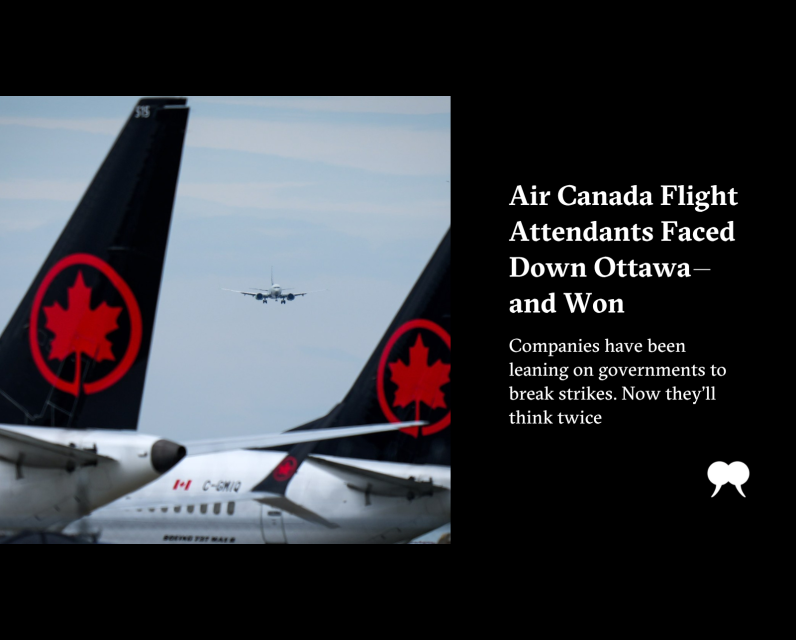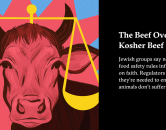Air Canada Flight Attendants Faced Down Ottawa—and Won

When the federal government ordered striking—and locked-out—flight attendants back to work on August 16, it was simultaneously attacking the constitutionally protected right to strike. Labour Minister Patty Hajdu waited a mere twelve hours after the Canadian Union of Public Employees (CUPE), the union which represents Air Canada flight attendants, announced the strike to use a section of the Labour Code to order workers back on the job and into binding arbitration, citing the risk of economic harm and travel disruptions. It’s a move the Liberals have been all too keen to pull in recent years.
The right to strike has been recognized by the Supreme Court. It’s a critical tool in the collective bargaining process. The ability of workers to withhold their labour is essential to securing fair deals from employers. Without the threat of losing the labour that makes business possible, employers have little to no incentive to bargain in good faith, or at all. And why would they, if they can rely on the federal government to intervene and order workers back to work and into binding arbitration any time there’s a labour dispute? That’s part of what has made the Air Canada strike such an important moment for labour: it was a test of just how far the government is willing to go to undermine workers’ rights.
If strikes aren’t an option for workers, there can be no fair and productive collective bargaining. For years, the feds have relied on section 107 of the Labour Code to end strikes, using it several times to impose binding arbitration in federally regulated industries. In those instances, unions complied with the order, went back to work, and accepted arbitration. This time, CUPE and national president Mark Hancock said no and defied the order, calling the government’s bluff. They won.
Even the Canada Industrial Relations Labour Board recognized the order was unreasonable and counterproductive, declining to ask the courts to enforce the order at first because it would have been “unduly punitive and not conducive to harmonious labour relations and constructive bargaining.”
With any luck, section 107 is now, if not a dead letter, at least a measure of last resort. In the past, governments were expected to debate back-to-work legislation in the House of Commons, which is a regrettable, fraught, and risky undertaking, but at least it’s public and premised on a need for debate and democratic accountability. Back-to-work legislation is not desirable, but it’s better than ordering workers back on the job and undermining a constitutionally protected right with the stroke of a minister’s pen. Section 107 made back-to-work and binding arbitration orders cheaper and easier, and repeated use of it by the Liberals normalized strike busting. Now, governments—particularly Mark Carney’s—may be inclined to think twice before going to the section 107 well. That’s good news for people who like labour and industrial peace.
During the negotiation process, Air Canada admitted its bargaining strategy was to rely on the federal government to force workers back on the job, which is to say, it had no intention to come to the table to bargain in good faith. Why would it, when the company had good reason to expect the government would do its dirty work? Flight attendants wanted to be paid for each and every hour they worked, including time on the ground, not just the “industry standard” of when the plane is moving.
Most people would recognize the expectation that workers be paid for the full time they’re at work as fair and reasonable. Office workers aren’t just paid for the time they’re on the phone. Why should flight attendants only be paid for the time spent in the air? But Air Canada didn’t want to pay for those hours, and had matters gone to binding arbitration, they might not have had to. Now, they do—at least some of it.
CUPE’s resistance to federal heavy-handedness has undermined the use of section 107 to undercut bargaining rights, so companies must now think twice about adopting a bad-faith strategy premised on the expectation that they won’t really have to bargain at all, but can instead rely on government intervention. In the long run, a reluctance to use section 107 would be good news for everybody. No one wants a strike if it can be avoided. Workers want to work. Employers want workers to work. Consumers want to buy the goods and services workers provide. But fair compensation and safe, reasonable working conditions are necessary to avoid strikes. Achieving and maintaining these conditions requires making deals.
As the government is fond of saying, over and over again, the best deals are made at the bargaining table. However, what they don’t say but should is that the best deals are made at the bargaining table when all parties are seated at it and prepared to negotiate in good faith. By removing the use of section 107 from the equation, or at least limiting its use, you increase the odds of good deals made in good faith by forcing companies to arrive ready to negotiate.
The Air Canada strike will go down in history for securing a better bargain for flight attendants and advancing the cause of pay for all hours worked in the airline industry. It will also be remembered for empowering unions and workers to assert their right to strike and to protect it against employers and federal governments who are all too keen to abrogate it. With any luck, it will also spell the end of federal abuses of the Labour Code, which would be a monumental outcome on top of everything else.
Adapted from “The Air Canada strike resolution was a big win for flight attendants—and all workers” by David Moscrop (Substack). Reprinted with permission of the author.
The post Air Canada Flight Attendants Faced Down Ottawa—and Won first appeared on The Walrus.



Comments
Be the first to comment